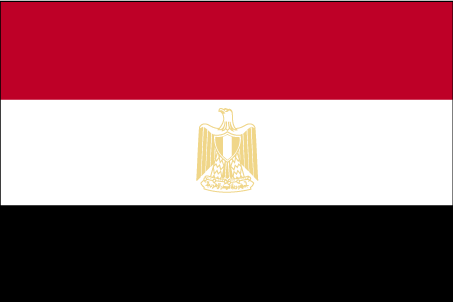| Egypt |

Background: | |
The regularity and richness of the annual Nile River flood, coupled with semi-isolation provided by deserts to the east and west, allowed for the development of one of the world's great civilizations. A unified kingdom arose circa 3200 B.C., and a series of dynasties ruled in Egypt for the next three millennia. The last native dynasty fell to the Persians in 341 B.C., who in turn were replaced by the Greeks, Romans, and Byzantines. It was the Arabs who introduced Islam and the Arabic language in the 7th century and who ruled for the next six centuries. A local military caste, the Mamluks took control about 1250 and continued to govern after the conquest of Egypt by the Ottoman Turks in 1517. Following the completion of the Suez Canal in 1869, Egypt became an important world transportation hub, but also fell heavily into debt. Ostensibly to protect its investments, Britain seized control of Egypt's government in 1882, but nominal allegiance to the Ottoman Empire continued until 1914. Partially independent from the UK in 1922, Egypt acquired full sovereignty with the overthrow of the British-backed monarchy in 1952. The completion of the Aswan High Dam in 1971 and the resultant Lake Nasser have altered the time-honored place of the Nile River in the agriculture and ecology of Egypt. A rapidly growing population (the largest in the Arab world), limited arable land, and dependence on the Nile all continue to overtax resources and stress society. The government has struggled to meet the demands of Egypt's growing population through economic reform and massive investment in communications and physical infrastructure. Egyptian youth and opposition groups, inspired by events in Tunisia leading to overthrow of the government there, organized a "Day of Rage" campaign on 25 January 2011 (Police Day) to include non-violent demonstrations, marches, and labor strikes in Cairo and other cities throughout Egypt. Protester grievances focused on police brutality, state emergency laws, lack of free speech and elections, high unemployment, rising food prices, inflation, and low minimum wages. Within several days of the onset of protests, President MUBARAK addressed the nation pledging the formation of a new government, and in a second address he offered additional concessions, which failed to assuage protesters and resulted in an escalation of the number and intensity of demonstrations and clashes with police. On 11 February MUBARAK resigned and national leadership was assumed by a Supreme Council of Armed Forces (SCAF). The SCAF dissolved the Egyptian parliament, suspended the nation's constitution, and formed a committee to recommend constitutional changes to facilitate a political transition through democratic elections. Following some delays, elections for a new parliament took place between November 2011 and January 2012. Presidential elections held in May and June witnessed the victory of Muslim Brotherhood candidate Mohammed MURSI over former Prime Minister Ahmed SHAFIQ. | |
Nationality: | |
noun: Egyptian(s) adjective: Egyptian | |
Ethnic Groups: | |
Egyptian 99.6%, other 0.4% (2006 census) | |
Languages: | |
Arabic (official), English and French widely understood by educated classes | |
Muslim (mostly Sunni) 90%, Coptic 9%, other Christian 1% | |
Population: | |
83,688,164 (July 2012 est.) country comparison to the world: 15 | |
Major Cities - Population: | |
CAIRO (capital) 10.902 million; Alexandria 4.387 million (2009) | |
| Statistics | |
| Percent Urbanization | 43 % |
| Total People Groups | 38 |
| Unreached People Groups | 22 |
| Region | Middle East and North Africa |
| 10/40 Window | Yes |
| Official National Language | Arabic, Standard |
| Secondary National Language | Arabic, Egyptian Spoken |
| Primary Religion | Islam |
| Percent Christian Adherent | 13.0% [1] |
| Percent Evangelical | 3.5% [2] |
| Country Progress Level | 3.1  |
| Persecution Ranking | 15 (1=High to 50=Low OD) |
| Human Development Index | 0.620 (0=Low to 1=High UN) |














